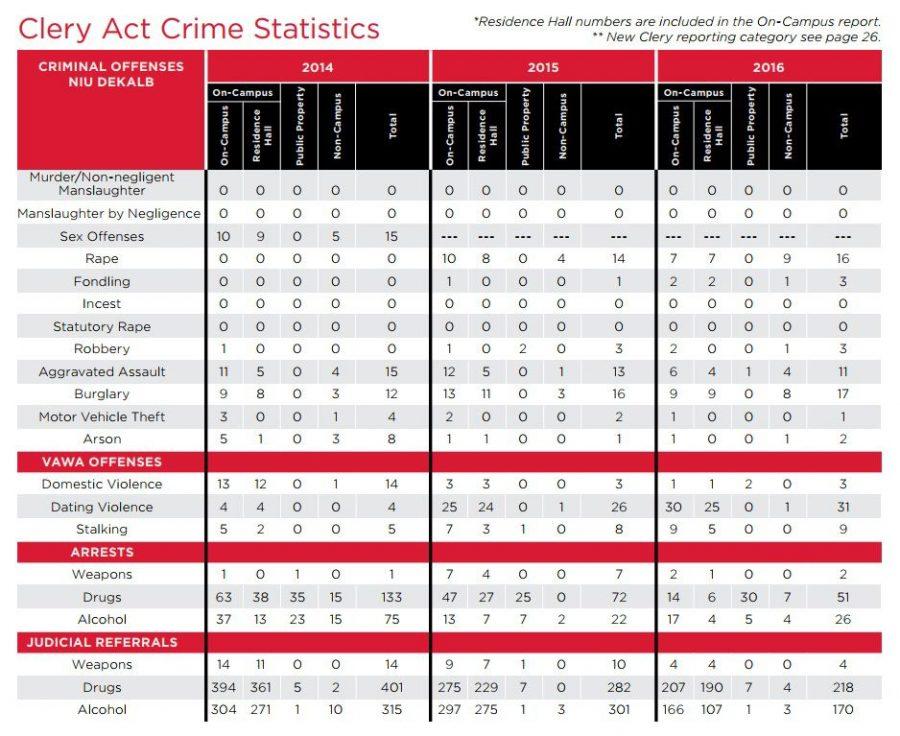Clery Report shows drop in campus crime
The above data reflects the amount of occurrences for various crimes at NIU’s DeKalb campus in 2014, 2015 and 2016. The data was collected for the 2017 to 2018 Annual Safety and Security Report, which is published in compliance with the Clery Act.
October 2, 2017
The 2017-2018 Annual Security Report released on Friday showed a trend of decreased offenses on the DeKalb campus.
The report is required to be released under the Clery Act, a federal law which orders the disclosure of campus security policy and crime statistics. The document provides information regarding crime statistics from 2014 through 2016, as well as information regarding campus security, personnel safety, crime prevention, emergency response procedures and crime-reporting policies, according to a Sept. 29 email sent by NIU officials.
Locations included in the report are on-campus for six NIU properties and off-campus, which includes streets, sidewalks and parking facilities accessible to campus.
Some changes to the reports include the inclusion of Clery Act statistics for the Chicago satellite campus and adjustments to the Uniform Crime Reporting Hierarchy Rule that allow “multiple criminal offenses committed during a single incident may now be logged separately, rather than under only by the most severe offense,” according to the email.
Other changes include sex offenses being subcategorized as rape, statutory rape, incest and fondling and the decriminalization of possession of 10 grams or less of cannabis.
“We encourage all members of our community to review this information and to ask us questions,” said NIU Police Chief Tom Phillips in a letter published with the report. “With this knowledge, we can all work more effectively to ensure that NIU continues to provide a safe and secure environment for living and learning.”
Increased reports
Six of the 20 offense categories reflected an increase in incidents between 2014 and 2016. Included in these categories are criminal offenses rape, for which reports increased from 0 in 2014 to 16 in 2016 and burglary, which increased from 12 cases in 2014 to 17 in 2016.
Violence Against Women Act offenses saw an increase in dating violence and stalking incidents, which accounts for two of three categories. Reports of dating violence went up from four to 31, and stalking reports increased from five to nine.
Decreased and unchanged reports
Aggravated assault cases went down from 15 cases in 2014 to 11 cases in 2016. Drug-related incidents saw the largest decrease in the arrests category, dropping from 133 in 2014 to 51 in 2016. Reported hate crimes remained consistent at zero in 2014 and 2016, though one “on-campus intimidation incident characterized by sexual orientation” was reported in 2015.
Domestic violence was the only Violence Against Women Act offense to see a drop, going from 14 offenses in 2014 to three in 2016.
In a letter included in the report, acting President Lisa Freeman pledged to protect students from sexual misconduct.
“We take seriously our commitment to protecting students from all forms of sexual misconduct, including sexual violence, dating violence, domestic violence and stalking,” Freeman said in the letter. “Accordingly, NIU offers a broad range of training, education and outreach programs, including not only prevention education, but also advocacy, counseling and consultation services.”
Judicial referrals made for weapons, drugs and alcohol collectively dropped between 2014 and 2016, with drug referrals being nearly cut in half after a drop from 401 to 218 cases.
Referrals are made when individuals are not arrested for alcohol, drugs and weapon offenses but are referred for campus disciplinary action, according to the report. A referral for campus disciplinary action does not mean that a violation of the law has occurred.
NIU Police Department officials did not respond to request for comment.







